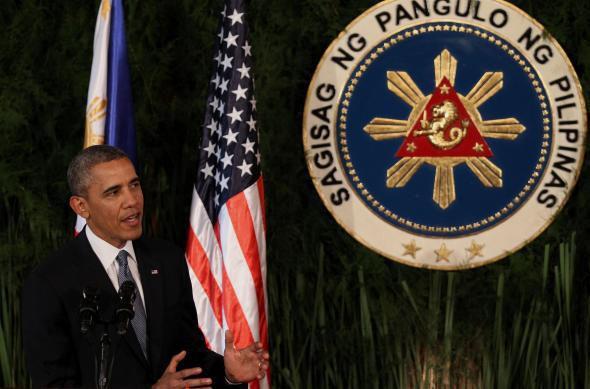President Obama got “all worked up,” as he put it, at a press conference with President Benigno Aquino of the Philippines yesterday, when Fox News’ Ed Henry asked him to respond to critics who say his foreign policy approach is defined by “weakness.”
It’s a long response, and the whole thing is worth reading, but essentially Obama attacked those who have criticized his failure to respond more forcefully to the crises in Ukraine and Syria, saying that “many who were proponents of what I consider to be a disastrous decision to go into Iraq haven’t really learned the lesson of the last decade.”
In a remark that seems aimed at the senior senator from Arizona, Obama said that his administration’s foreign policy approach “doesn’t make for good argument on Sunday morning shows,” but “steadily advance[s] the interests of the American people and our partnership with folks around the world.”
Mark Landler of the New York Times summarized the response, saying, “Mr. Obama said his foreign policy was based on a workmanlike tending to American priorities that might lack the high drama of a wartime presidency but also avoided ruinous mistakes.”
The phrase struck me, first of all, because Obama is a wartime president. This was more blatantly true during his first term, but the U.S. still has 33,000 troops in Afghanistan. That’s far fewer than at the peak of his administration’s surge strategy, and the drawdown is continuing, but it’s still more than at any time during George W. Bush’s presidency.
And that’s just the declared military operation. Some have also argued that in addition to Afghanistan and—until the end of 2011—Iraq, we should consider the Obama-era covert drone and special ops campaigns in Pakistan, Yemen, and Somalia to be “undeclared” wars.
Covert U.S. military operations are nothing new, of course, but modern technology and tactics—drones in particular—allow them to last much longer with much more lopsided casualty counts. The U.S. certainly doesn’t feel like it’s a nation at war to its citizens (except for those with family or friends in the military), though it likely looks that way from Yemen.
As Peter Bergen argued a while ago, it’s a bit strange that even after the Afghan surge, years of drone strikes, and the forcible overthrow of the Libyan government, “most conservatives view the president as some kind of peacenik.”
In today’s remarks, the president addressed critics of his Syria policy, saying that “they themselves say, no, no, no, we don’t mean sending in troops. Well, what do you mean?”
What we may be seeing here is how the debate over the use or nonuse of military force is conducted in a world where it’s assumed that American military operations will not involve high numbers of American casualties.
Obama has undeniably benefited from this state of affairs: he’s been able to conduct deadly military campaigns for years without—except for pockets on the anti-war left and the libertarian right—the kind of public scrutiny that previous presidents might have faced. But it’s also emboldened his critics to call for “strong” U.S. responses to various crises without having to justify why such responses would be worth large numbers of young American coming home in body bags.
Obama is, in effect, a wartime president of a peacetime country, which has had some very strange effects on our foreign policy debate.
For one thing, it was a rough week for the administration’s diplomatic goals, which saw both the collapse of the latest round Israeli-Palestinian talks and a failure to clinch a long-anticipated trade deal with Japan. On Obama’s own criteria for success—advancing U.S. interests and partnerships—there’s ample room for criticism. Given the material he had to work with, Ed Henry’s question actually seemed like a bit of a softball.
Since most Americans are, if anything, in a more isolationist mood than the White House at the moment, continuing to attack the president on the basis that he’s too conflict-averse would seem to only work to his advantage.
And it’s an approach that only makes sense in a world where we all pretend that the U.S. has been at peace for the last five years.
